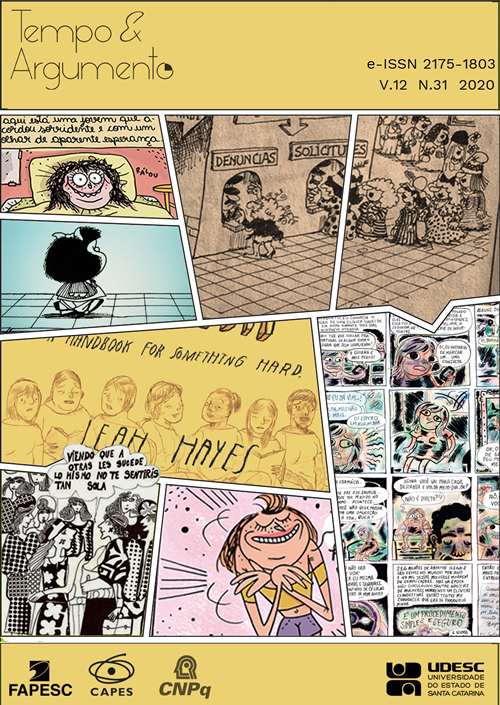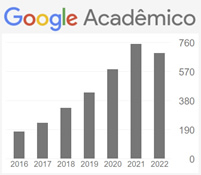“Humor is a war that doesn’t produce death, but laughter”: a historical analyses of Diana Raznovich’s latin american feminist graphic humor (1990)
DOI:
https://doi.org/10.5965/2175180312312020e0103Abstract
Diana Raznovich’s feminist graphic humor is an instrument of intervention aimed to discuss the discrimination suffered by women, exposing structures that imprisoned them in the final years of the twentieth century, context of feminist struggles. Understood as war-humor that has as effect the laughter, the production of the argentinian cartoonist, one of the first admittedly feminist graphic humorists in Latin America, demonstrates the complexity and fluidity of humor produced with a gender perspective, a challenge to the limited approaches of Humor Cultural History, marked by a canon and male theoretical elaborations. Facing this theoretical and historical scenario, this article intends to develop a historical analyses of Diana Raznovich’s feminist graphic humor. Focusing on discussions about the role of women in humor production, on debate about the ideas of private/public in humor, on change potential of feminist humor and on impact of discourses on femininity in the production of laughter, I intend, from texts and cartoons published in Latin American newspapers in the 1990s, discuss about revolutionary political potential of Diana Raznovich's feminist humor.
Keywords: Diana Raznovich. Feminism. Graphic Humor. War-humor. Latin America.
Downloads
References
BARRECA, Regina. They used to call me snow white... but I drifted: women’s strategie use of humor. Penguin Book’s: USA, 1991.
CIXOUS, Hélène. O riso da Medusa. Journal of Women in Culture and Society. v. 1, n. 4, p. 875-893, Universidade de Chicago, 1976.
COTIDIANO MUJER. Urgente: se necesitan mujeres dispuestas a reír. Cotidiano Mujer, Montevideo, Ano 3, n. 20, 3 ago. 1987.
CRESCÊNCIO, Cintia Lima. Bia Sabiá em “O pessoal é político”: (re)invenção do político no humor gráfico feminista de Ciça (Nós Mulheres, 1976-1978). Fronteiras, Grande Dourados, v. 20, n. 35, p. 117-136, 2018.
CRESCÊNCIO, Cintia Lima. Humor Feminista. In: COLLING, Ana Maria; TEDESCHI, Losandro Antônio (org.). Dicionário crítico de gênero. 2. ed. Dourados: Ed. Universidade Federal da Grande Dourados, 2019. v. 2. p. 405-408.
CRESCÊNCIO, Cíntia. Quem ri por último, ri melhor: humor gráfico feminista (Cone Sul, 1975-1988). Tese (Doutorado em História) – Programa de Pós-graduação em História, Universidade Federal de Santa Catarina, Florianópolis, 2016.
DANTAS, Daiany Ferreira. Autobiografia de mulheres cartunistas: a aventura íntima da alteridade reinventada. Labrys, études féministes/estudos feministas, n. 19, jan./jun. 2011.
ERGÜL, Hilal. Gender roles in humor. In: ATTARDO, Salvatore (ed). Encyplopedia of humor studies. Texas: Texas A&M University, 2014. p. 262-263.
FRIEDAN, Betty. The feminine mystique. Nova York: Norton, 1963.
HOLT, Thomas. A articulação entre raça, gênero e economia política no programa britânico de emancipação, 1838-1866. In: COOPER, Frederick et al. (org). Além da escravidão: investigações sobre raça, trabalho e cidadania em sociedades pós-emancipação. Rio de Janeiro: Civilização Brasileira, 2010. p. 91-129.
KASPER, Kátia Maria. Experimentações clownescas: os palhaços e a criação de possibilidades de vida. Tese (Doutorado em Educação) – Faculdade de Educação, Universidade Estadual de Campinas, Campinas, 2004.
KEMPINSKA, Olga Donata Guerizoli. Ironia e discurso feminino. Revista Estudos Feministas, Florianópolis, v. 22, n. 2, p. 465-476, maio/ago. 2014.
LE GOFF, Jacques. O Riso na Idade Média. In: BREMMER, Jan; ROODENBURG, Herman (orgs.). Uma história cultural do humor. Rio de Janeiro: Record, 2000. p. 65-82.
MACCLINTOCK, Anne. Couro Imperial: raça, gênero e sexualidade no embate colônia. Campinas: Editora da Unicamp, 2010.
MARRA, Margareth. Subversive humor. In: ATTARDO, Salvatore (ed). Encyplopedia of humor studies. Texas: Texas A&M University, 2014. p. 742-744.
PERROT, Michelle. As mulheres ou os silêncios da história. Bauru, SP: EDUSC, 2005.
PIRES, Maria Conceição. Mulheres desregradas: autorretrato e o corpo grotesco nos cartuns de Chiquinha. Topoi, Rio de Janeiro, v. 20, n. 41, p. 302-316, maio/ago. 2019.
POLLOCK, Griselda. Diferenciando: el encuentro del feminismo com el canon. In: REIMAN, Karen Cordero; SÁENZ, Inda (orgs.). Crítica feminista en la teoría e historia del arte. [Cidade do México]: Universidad Iberoamericana, 2007a. p. 141-160.
POLLOCK, Griselda. Visión, voz y poder: historias feministas del arte y marxismo. In: REIMAN, Karen Cordero; SÁENZ, Inda (orgs.). Crítica feminista en la teoría e historia del arte. [Cidade do México]: Universidad Iberoamericana, 2007b. p. 45-80.
RAZNOVICH, Diana. Algunas cuestiones sobre el humor feminista. Feminaria, Buenos Aires, v. 7, n. 13, p. 30, nov. 1994.
RAZNOVICH, Diana. El humor de las humoristas. Dossiers Feministes, Castellón de la Plana, n. 8, p. 15-22, 2005. Humor y Mujeres: ¿Lo Pillas?
RAZNOVICH, Diana. Llorar em privado, reir em publico. Fempres, Santiago, ano 171, jan. 1996a.
RAZNOVICH, Diana. [Contracapa]. Fempress, Santiago, n.178, contracapa, ago. 1996b.
RAZNOVICH, Diana. [Contracapa]. Fempress, Santiago, n. 182, contracapa, dez. 1996c.
RAZNOVICH, Diana. [Contracapa]. Fempress. Santigago, n. 175, contracapa, mai. 1996d.
RAZNOVICH, Diana. [Contracapa]. Fempress. Santiago, n. 177, contracapa, jul. 1996e.
RAZNOVICH, Diana. [Contracapa]. Fempress. Santiago, n. 172-173, contracapa, fev./mar. 1996f.
RAZNOVICH, Diana. [Contracapa]. Fempress. Snatiago, n. 171, contracapa, jan. 1996g.
RAZNOVICH, Diana. [Contracapa]. Fempress. Santiago, n. 180, contracapa, out. 1996h.
SCOTT, Joan Wallach. A cidadã paradoxal: as feministas francesas e os direitos do homem. Florianópolis: Ed. Mulheres, 2002.
SKINNER, Quentin. Hobbes e a teoria clássica do riso. São Leopoldo: Editora da Unisinos, 2002.
VARIKAS, Eleni. O pessoal é político: desventuras de uma promessa subversiva. Tempo, Rio de Janeiro, v. 2, n. 3, p. 59-80, 1996.
WALKER, Nancy. Humor and Gender Roles: the ‘funny’ feminism of the Post-World War II Suburbs. In: DUDDEN, Arthur Power. (ed). American Humor. Oxford: Oxford University Press, 1987, p. 118-137.
WALKER, Nancy. What’s so funny?: humor in american culture. Maryland: Rowman & Littlefield Publishers, 1998. (American Visions, 1.)
WOLLSTONECRAFT, Mary. Reivindicação dos direitos da mulher. São Paulo: Boitempo, 2015.
WOOLF, Virginia. Um teto todo seu. São Paulo: Círculo do livro, 1994.
Downloads
Published
How to Cite
Issue
Section
License
Copyright (c) 2020 Tempo e Argumento

This work is licensed under a Creative Commons Attribution-NonCommercial 4.0 International License.
The articles published by the magazine are for free use, destined for educational purposes and not commercial. The copyrights are all granted to the magazine. The articles whose authors are identified represent the expressed opinion of its authors and not the official position of the Tempo e Argumento magazine or of the Postgraduate Program in History of the Universidade do Estado de Santa Catarina.




